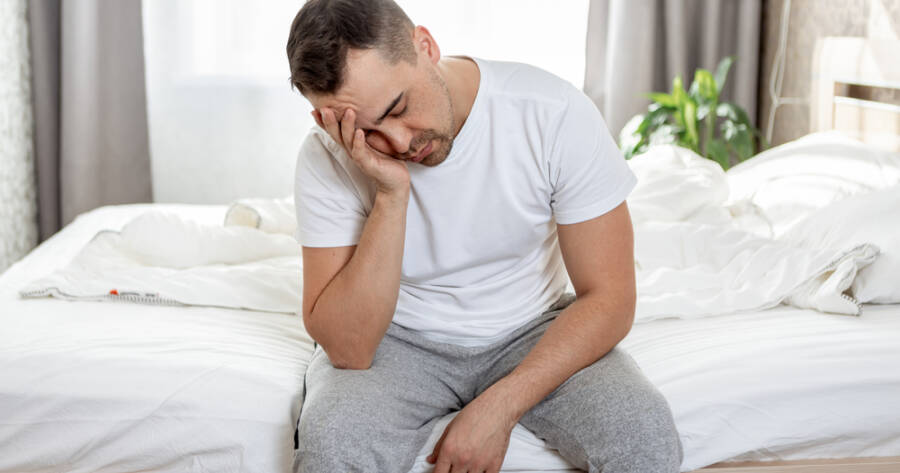Night sweats troubling your sleep? Understand night sweats, take control, and reclaim your comfort. While night sweats can have non-medical causes, they can have medical causes.
From lifestyle adjustments to consulting with healthcare professionals, there are various paths to consider for alleviating night sweats and improving your overall sleep quality. Take a little time to explore your options.
Understanding Night Sweats: The First Step to Peaceful Sleep
Imagine waking up in the middle of the night, drenched in sweat, feeling uncomfortable and unable to go back to sleep. This is a common experience for many men who suffer from night sweats. But what exactly are night sweats?
Night sweats, also known as sleep hyperhidrosis, are episodes of excessive sweating that occur during sleep.1 They can be so severe that they soak through your pajamas and bedding, leaving you feeling clammy and uncomfortable. Night sweats can disrupt your sleep, leaving you tired and irritable the next day.
Unveiling Causes: Taking Control of Night Sweats
There are several potential causes of night sweats in men.2 It’s important to identify the underlying cause in order to effectively treat the problem. Here are some common causes:
Hormonal Imbalances
Hormonal imbalances, such as low testosterone levels, can contribute to night sweats in men. As men age, their testosterone levels naturally decline, which can lead to night sweats and other symptoms like hot flashes and mood swings. Hormone replacement therapy may be recommended to restore hormonal balance and alleviate night sweats.
Infections
Infections, such as tuberculosis or HIV, can cause night sweats. These infections can disrupt the body’s normal temperature regulation, leading to excessive sweating during sleep. Treating the underlying infection is crucial in resolving night sweats.
Medications
Some medications, including antidepressants, hormone therapy drugs, and certain diabetes medications, can cause night sweats as a side effect. If you suspect that your medication is causing night sweats, consult with your healthcare provider to explore alternative options.
Medical Conditions
Various medical conditions can contribute to night sweats in men. These include gastroesophageal reflux disease (GERD), sleep apnea, and certain types of cancer, such as lymphoma. Treating the underlying medical condition can help alleviate night sweats.
Exploring Lifestyle Factors: A Key To Reducing Night Sweats
Lifestyle choices can significantly impact the occurrence and severity of night sweats. Factors such as diet, exercise, and sleep environment play a crucial role in managing this condition. Consuming spicy foods, caffeine, or alcohol close to bedtime can trigger or worsen night sweats. Similarly, a lack of regular physical activity may contribute to poor sleep quality, potentially exacerbating night sweat episodes. Evaluating and modifying these lifestyle factors can be a simple yet effective way to reduce the frequency and intensity of night sweats, leading to more comfortable and restful nights.
Creating an optimal sleep environment is also essential in managing night sweats. This includes maintaining a cool, well-ventilated bedroom and using breathable, moisture-wicking bedding and sleepwear. Small changes in the sleep setting can have a significant impact on body temperature regulation during the night. By focusing on these aspects, individuals can create a conducive environment for cooler and more comfortable sleep, thus mitigating the discomfort caused by night sweats.
Effective Treatments: Embrace Cool, Uninterrupted Rest
Once you have identified the cause of your night sweats, there are several treatment options available to help you find relief and regain peaceful sleep.3 Here are some effective treatments:
Lifestyle Modifications
Simple lifestyle changes can make a big difference in managing night sweats. Avoiding triggers such as spicy foods, caffeine, and alcohol can help reduce the frequency and severity of night sweats. Keeping your bedroom cool and well-ventilated, using breathable bedding, and wearing moisture-wicking sleepwear can also help keep you cool and comfortable throughout the night.
Hormone Replacement Therapy
If hormonal imbalances are the cause of your night sweats, hormone replacement therapy may be recommended. This involves replacing the deficient hormones, such as testosterone, to restore balance and alleviate symptoms. Hormone replacement therapy should always be done under the guidance of a healthcare professional.
Medication Adjustments
If your night sweats are caused by medications, your healthcare provider may be able to adjust your dosage or switch you to a different medication that does not have night sweats as a side effect. It’s important to never stop or adjust your medication without consulting your healthcare provider first.
Treatment of Underlying Medical Conditions
If your night sweats are a symptom of an underlying medical condition, treating that condition is crucial in alleviating night sweats. This may involve medications, surgery, or other interventions depending on the specific condition.
Why You Should Learn More About Night Sweats
Understanding the causes and treatment options for night sweats is the key to reclaiming your comfort and enjoying uninterrupted rest. Don’t let night sweats disrupt your sleep any longer. Take control of your nights and start searching online today to learn more about night sweats and find the solution that works best for you.
